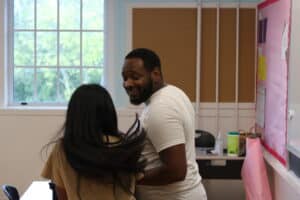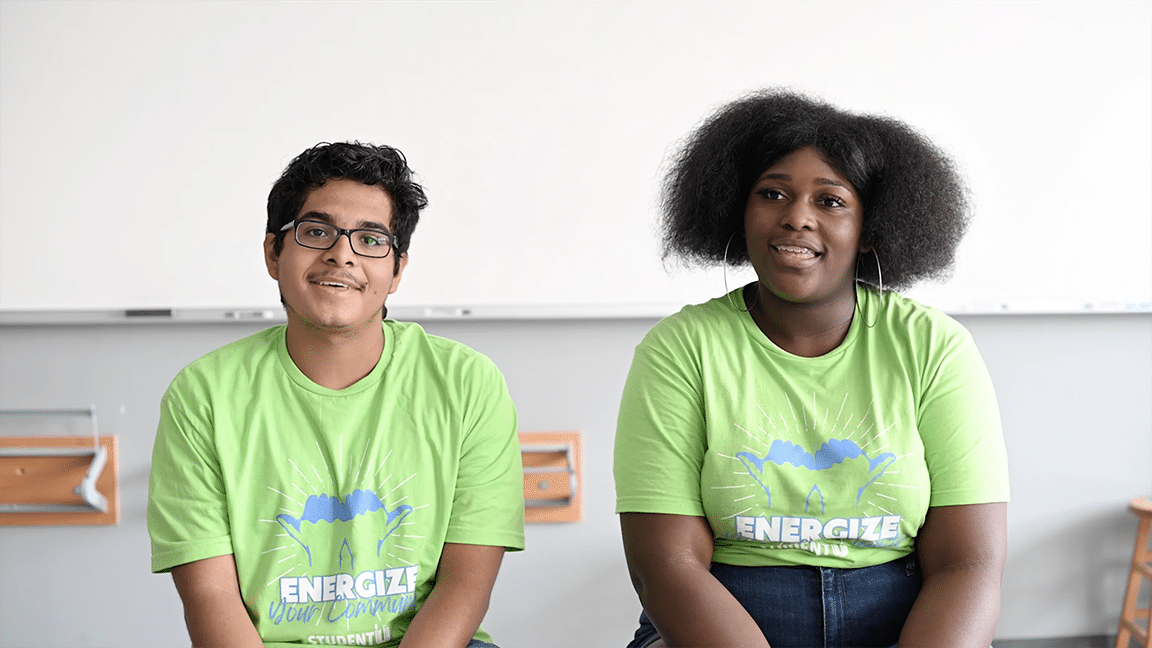Supporting the Next Generation of Leaders in the Classroom
By Allie Bradford Brown
Welcome to the Youth Work 101 Series! Student U offers this blog series to support youth work practitioners, educators, advocates for young people, and after-school professionals in their work by sharing what has worked for us. For insights on this month’s topic, Allie Bradford Brown, Student U’s Advancement Writing Associate, interviewed Lonnie Kendall, one of Student U’s Middle School Program Coordinators and a former Student U student.
Two things are true about Lonnie Kendall: He is a hard worker, and he brings out the best in others.
Working Hard
Throughout his time at Student U, Lonnie worked hard enough to graduate from high school and attend college. During college, Lonnie says, “I took a job where it felt like I was just clocking in and clocking out… Our manager would ask, ‘Who wants to clean the bathroom?’ and I would volunteer because I wanted to actually contribute and do something.” At a check-in with his Student U college advisor Derrick Beasley, Lonnie expressed his desire to find more meaningful work, and was surprised to hear that Student U was hiring. “As I tell students all the time, I never would have thought I’d come back [to work at Student U]. But it was a good-paying job that had a real purpose, so I decided to go for it.” And his hard work at Student U continues.
As a Middle School Program Coordinator, Mr. Lonnie has gained a greater appreciation for the amount of work and intentionality that went into making his own Student U experience such a success. “Going from being a student to being a teacher was very different. I was one of those students who thought teachers were just showing up and having fun like us, but it’s actually a lot of work to create this community to help folks have fun and feel at home while they’re learning. I have always loved making people around me smile and laugh and feel loved–I’ve always had that in me–-so it just felt natural being back in this space where everyone cares about others. It felt like home.”
Feeling Successful
At Student U, everything we do is with student success in mind. But as Mr. Lonnie puts it, “At Student U, our vision is for all students to be successful. My goal is for students to feel successful… And I make sure that all of my students have a smile on their face at some point during the day.” Lonnie has observed that students’ vision of success, which is often informed by the media they consume, includes things like having your own house and car, a cool job, fancy watches and gadgets, and lots of money–that wealth equals success. However, at Student U, the way we help students actually feel successful is by encouraging them to set their own goals. “If I have a student who wants to be a mechanic and work on cars, I tell him I’m proud of that dream. Then we help him become the best mechanic in Durham, in North Carolina. And because it’s his goal, when he wants it and goes to get it, he feels successful.” Mr. Lonnie is also straightforward with his students. “I tell kids that when I first started working at Student U, I didn’t have a car and I still stayed with my parents. But I felt successful because I had an occupation where I could make a difference… I use my own experiences, even my own slip-ups, to help students–and that’s what makes me feel successful.”
Stepping Stones to Success
Helping students feel successful is one way Lonnie builds up future leaders at Student U, even amidst really challenging circumstances. As a student, Lonnie felt that a lot of his school experience was rigid, straight to the point, and very serious. And sometimes, it was just tough to be a high schooler. “At my high school, I had friends get kicked out of school, go to jail, even get shot and killed–but at Student U, I always felt like I could come back, take a breath, be myself, and just relax a bit more.” Student U intentionally brings joy in a world that can be really difficult to cope with, and Lonnie knows firsthand how important it is to carry on that legacy. “My main thing is for students to know that if they don’t have anybody else, they’re down and out, need a ride or a meal, need someone to talk to, they can call me. And we can talk about anything. I had mentors like that at Student U, and I want to be that mentor for the current students.”
Even as an educator, Lonnie acknowledges the fact that life is not always a math problem or an essay or a science solution–it can be messy and complicated, and he wants to be there when students face life’s problems just as much as for math problems. “Instead of shielding them from (real life), we place careful boundaries and we do talk through issues students face so they can be prepared and don’t go out into the world and get into tough situations they didn’t understand.” Lonnie wants his students to have background knowledge and good sense about what they might face in life. He often tells students, “I’m not just about academics. I want you to be the best person you can be. I tell students I want them to be better than me. I want them to have what I have and even more. I’m here to set them up to be better.” At Student U, we elevate the next generation of students by creating stepping stones for them. Then they can become a stepping stone for the next generation after that. We try to break harmful cycles and elevate cultural strengths so that each generation can be better-off than the last.

Strategies for Helping Students Thrive as Students and Leaders
Developing successful leaders comes somewhat naturally to Lonnie. What he often tells new teachers is that “students won’t respect who they don’t trust, and won’t trust who they don’t know. Get to know them and allow them to get to know you as well. You don’t have to be an open book, but be open.” Being vulnerable with the students helps them build trust and connections in the classroom. As a teacher, Lonnie expects respect and gets it by first respecting his students. It all comes down to relationships.
Lonnie likens his groups of students to families–”We might argue and get on each other’s nerves, but we’re going to hold each other accountable and show love and respect for each other. Yeah we’re all different, but we are a team. We all have something to contribute.” Letting the students know that they are included in the community–that their input, mood, and behavior affects others–helps them develop maturity and leadership. Students really want to be heard, and rather than a “my way or the highway” approach that is common in many classroom settings, Student U tries to give students a voice and opportunities for trial and error so everyone can contribute to classroom culture. Lonnie uses Restorative Practices principles to ensure that every student has a voice and feels respected.
Finally, Lonnie emphasizes the importance of knowing that every day is a new day–for everyone. “Give a clean slate and always expect the best,” he recommends. “There is no such thing as a bad student. They might be having a moment or need some help, but I’ll never turn my back or give up on them.” By sticking with them through thick and thin, Lonnie knows that Student U’s incredible students of today will become the transformational leaders of tomorrow.
___
Donate to Student U and keep posts like this one coming.
Subscribe to this blog by entering your email.










